Fisheries, Conservation, Fish Farming
We work to enhance and conserve Pemba's vital coastal resources: coral reefs, lagoons and mangrove forests; and we are developing eco-friendly fish farming.
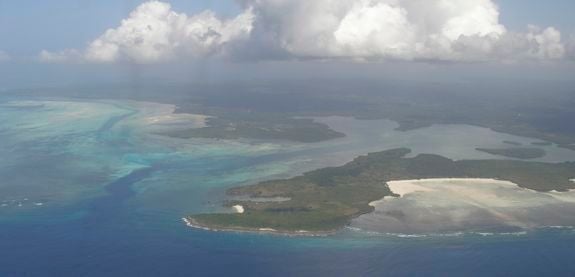

Approaching Pemba from the south in typical rainy season weather. The reefs and lagoons of Pemba's west coast are a biodiversity hotspot.
The islands, lagoons, reefs and mangrove forests of Pemba's 40-mile long west coast are one of East Africa's most important concentrations of marine biodiversity.
The coast is heavily used for fishing, shellfish gathering, seaweed farming, and mangrove cutting. It's a vital source of food and income for Pemba. Fresh fish is on sale every day in the markets, and finds its way throughout the island via an informal network of bicycle fish sellers.
In spite of the pressures the reefs and mangroves are still relatively healthy. But populations and exploitation are growing, and biologists say that if the treasures of Pemba's west coast are to be preserved for the future, protection has to be introduced. A start was made as far back as 1993, when one of the best of the reef systems, around Misali Island, was made a conservation zone, with a core area closed to fishing, enforced by a ranger patrol. The remarkable story of how this came about is told in a documentary, the making of which led to the formation of the Pemba Foundation.
Following the Misali success, the Zanzibar government declared the entire Pemba west coast a conservation area. But it's been a challenge to patrol and manage such a large area -- about 1,000 sq km. Eventually even the Misali closed area suffered, the marker buoys disapperaed and enforcement weakened.
People know that Pemba's reefs and waters are overfished. Experienced fishers tell us that catches are reduced, fish are smaller, and they want to see conservation. In response, the Pemba Foundation developed a co-operative program, involving fishing communities and the government Fisheries Department, to implement small, community-run conservation areas, modeled on Misali Island. This kind of inclusive program has been shown to be effective in other parts of the world also subject to heavy pressure by artisan fishers.
In late 2015 the Pemba Foundation sponsored meetings with the 35 fishing villages that could be involved in the creation of conservation areas, or MPAs (marine protected areas). Meetings were held in 4 Pemba regions, with 61 community representatives attending. Support for MPAs was close to unanimous.
As a result of the meetings, in 2017 we set out the buoys to mark a new MPA, closed to fishing and patrolled by community rangers in a boat provided by the Pemba Foundation. This area -- the first in an intended multi-area program -- was created at the request of Gando village, whose representatives had attended the meetings, and set up in co-operation with the Fisheries Department and the Zanzibar Institute of Marine Sciences (IMS). From IMS, Dr. Saleh Yahya trained Gando's rangers, while Dr. Narriman Jiddawi created a catch-reporting system.
We also worked with the rangers at Misali Island to replace the buoys marking the original closed area.
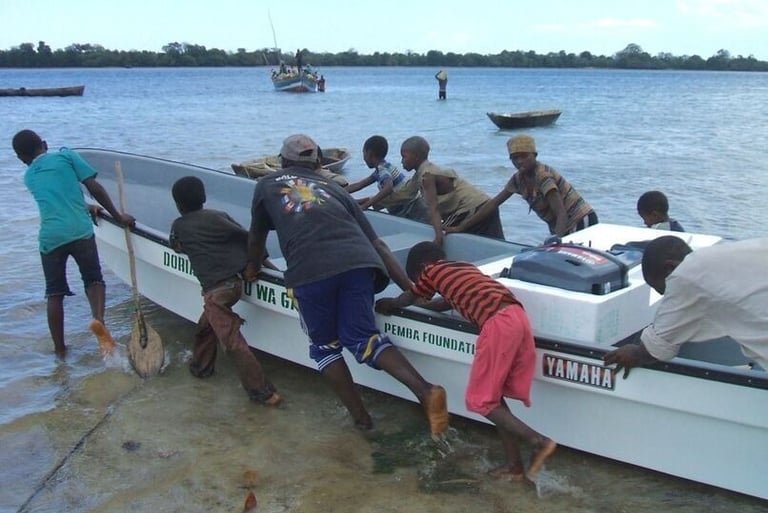

Launching Gando village's new fisheries patrol boat
The Gando village closed area was successfully maintained for about a year until the patrol boat's motor was stolen. It took us more than a year to recover it, and before the village could restart patrolling the Covid pandemic hit. All agreed to let the government Health Department use the boat to transport patients along the coast, and our fisheries conservation program was suspended. We will restart when funding allows.
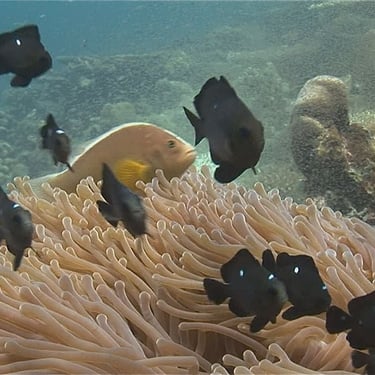
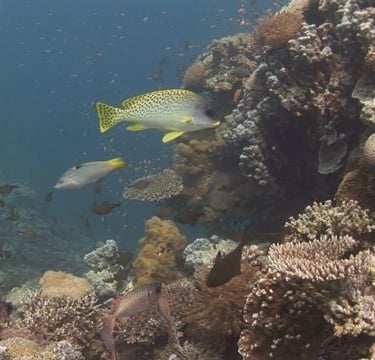
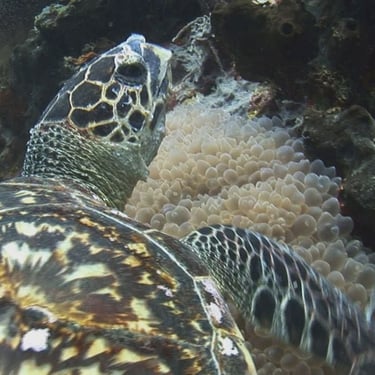
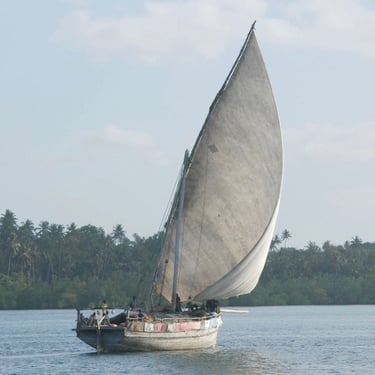
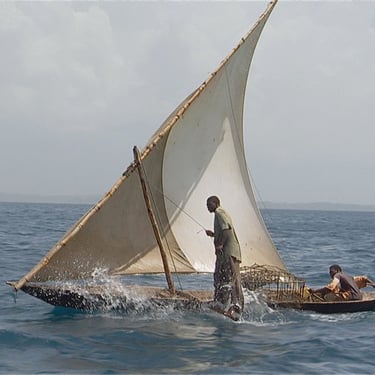
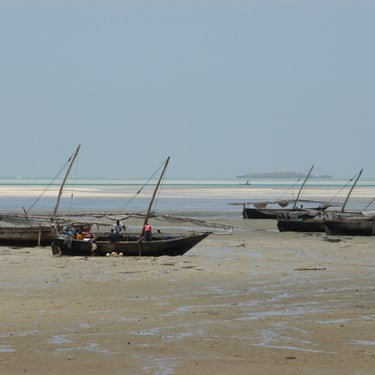
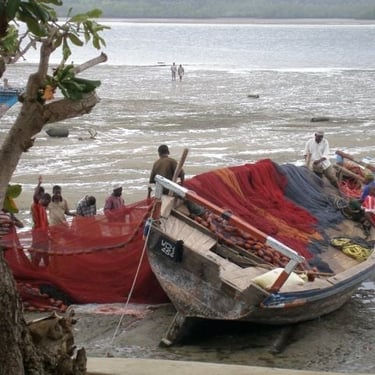
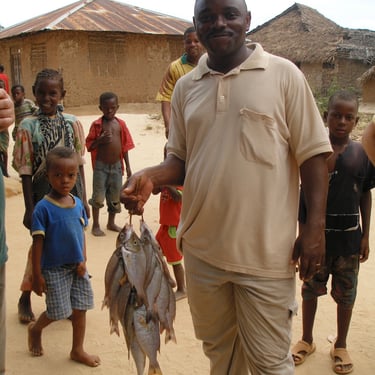
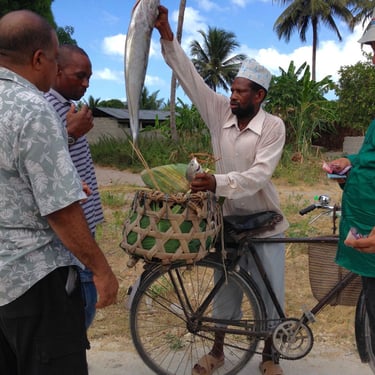
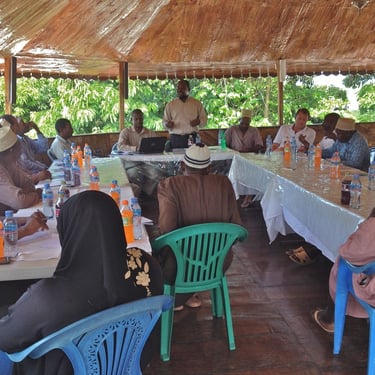
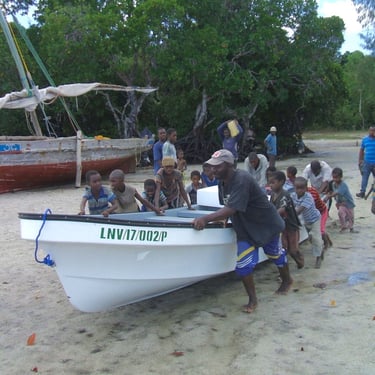
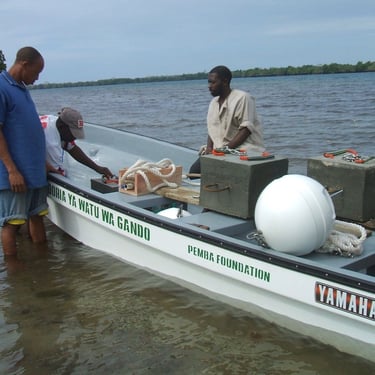
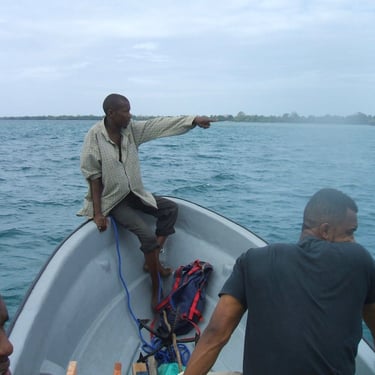
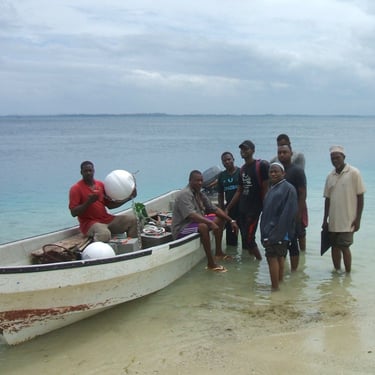
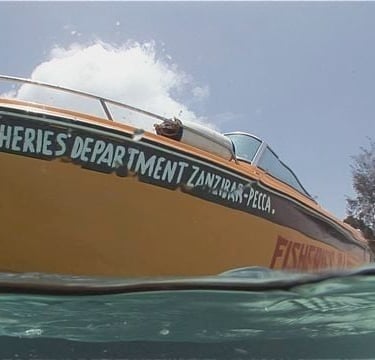
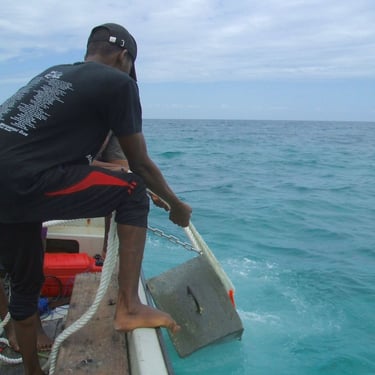
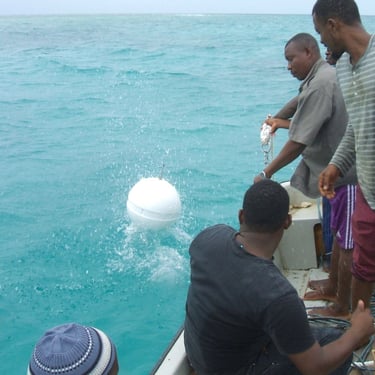
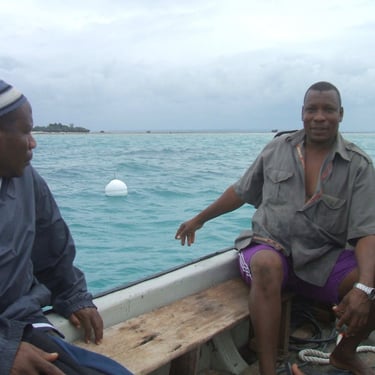
Misali Island reef
Misali Island reef
Misali Island reef
Pemba's fishing boats are mostly sail powered
Trap fishermen work close to shore, using a dugout canoe
Pemba has thousands of fishing boats
Nets are size regulated & must be kept off coral
Fish from the west coast is consumed all over Pemba
Bicycle fish seller
Pemba Foundation meeting with village leaders and Fisheries Department
Patrol boat for Gando village's new marine protected area
Buoys to mark the marine protected area
Gando fisherman points out protected area to be marked
Misali rangers and marker buoy team
Misali Island ranger patrol boat
Laying down a marker buoy anchor
Buoy is launched
Haji, Misali ranger for 20 years, is glad to have the buoys back in the protected area
Mangrove Restoration
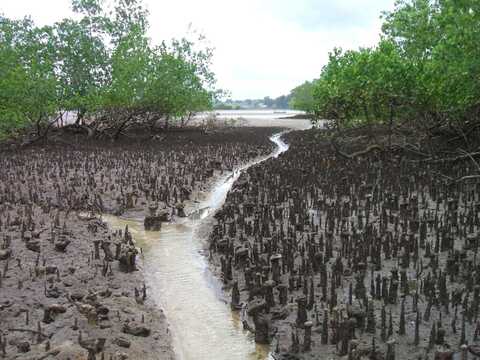

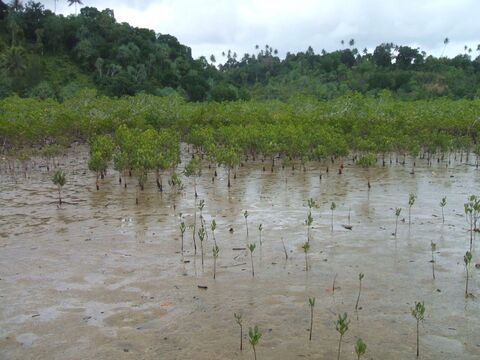

Cut coastal mangrove forest
Replanted area
With Ali Said, fisheries scientist and Pemba Foundation adviser, we have completed a mangrove restoration project, and plan to do more.
Mangroves are a vital part of coastal ecology: they provide shelter and nursery areas for many marine species; they filter the water; and they stabilise coastlines by providing a buffer against wave action. But they are also a convenient source of wood for house and boat building, charcoal, and the stakes used in seaweed farming. In Pemba, as in much of the tropics, people cut the mangroves without realising that they may be damaging their fish catch offshore, or opening up their shoreline to erosion.
Mangrove restoration takes time and work -- you harvest the seeds that grow in healthy areas, then plant them out one by one in cut areas.
This restoration project involved six coastal villages, in an area where there's been heavy cutting of mangroves. Volunteers from the villages did all the hard work: around 3,000 person-days between seedling gathering and planting out. 180 volunteers were split into 6 groups, each of which received half a day of training from Ali Said, including discussion on the ecological value of mangroves. The Pemba Foundation co-ordinated the project and covered costs.
Over the course of 2 months the volunteers were able to re-plant about 300,000 seedlings in 5 hectares (12 acres) of mangrove areas that had been destroyed.
Every year 1-2% of Pemba's 30,000 acres of mangrove forest is lost, so we'll be doing as much mangrove replanting as we can find funds for.
About 2-1/2 years after the re-planting was completed, we re-visited the areas to check on progress. It was a partial success (see pictures below): about 30% of the seedlings had survived; some had never taken root, others had grown well for 2 years, and then died. This was a typical success rate for this kind of restoration method, and we've learned some valuable lessons.
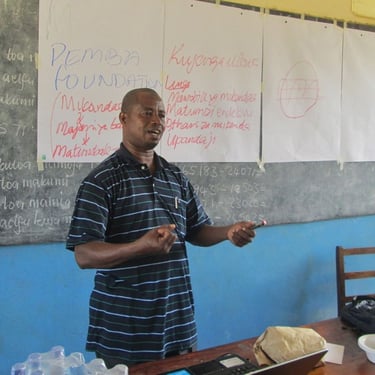
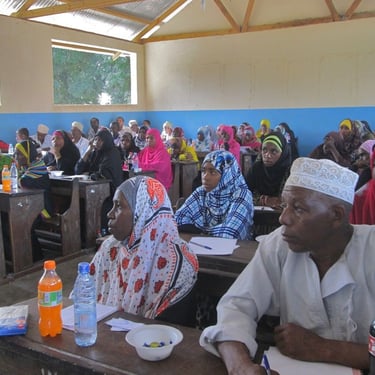
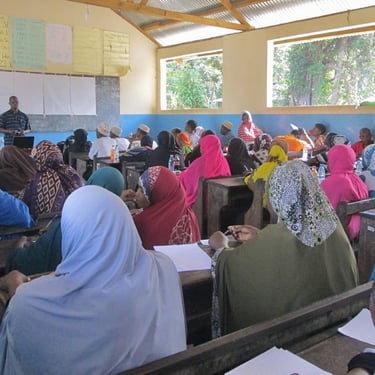
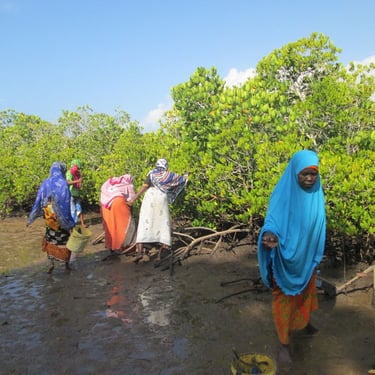
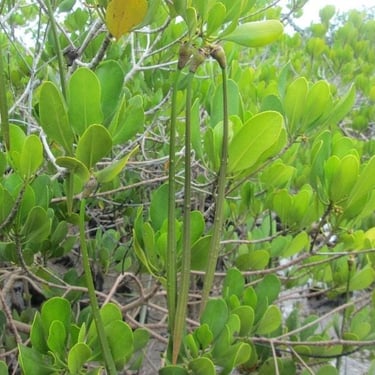
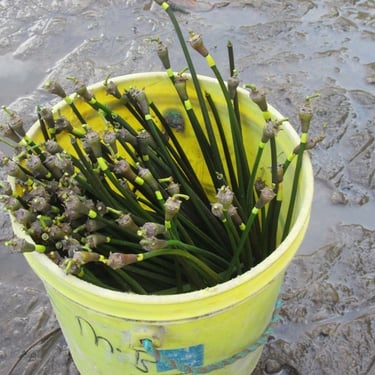
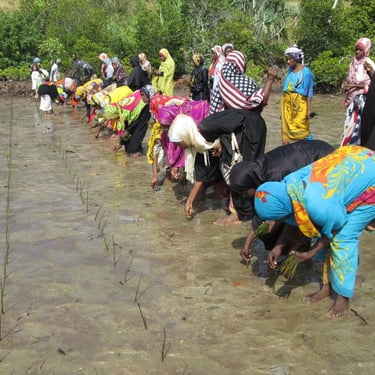
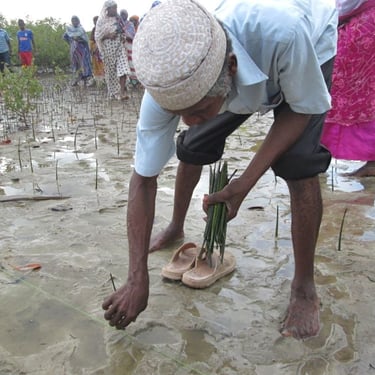
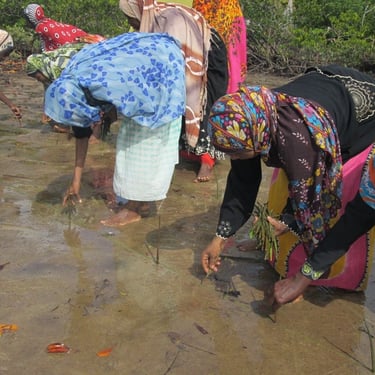
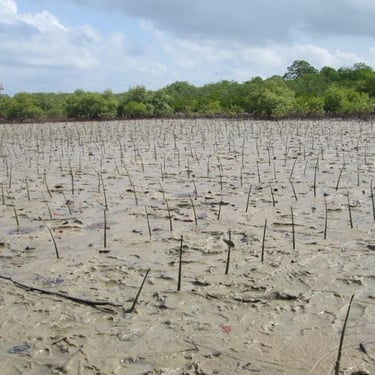
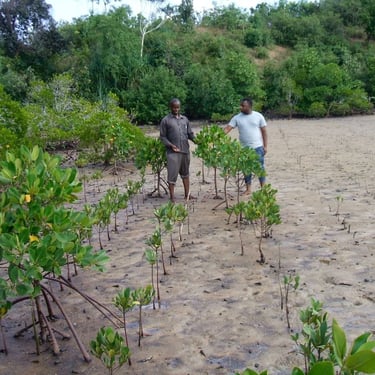
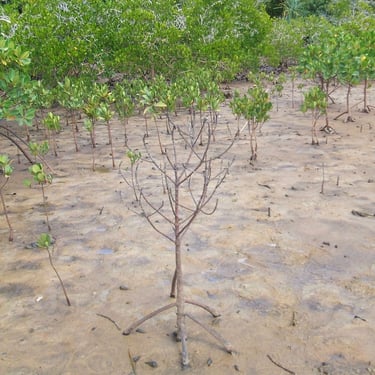
Pemba Foundation adviser Ali Said gave 2 classes a day for 3 days
Refreshments courtesy Pemba Foundation
180 volunteers completed training
Collecting mangrove seeds
Planting continued for days
Planting in cut and destroyed area
Seeds ready for planting
Healthy mangroves produce many seeds
300,000 seeds were planted
Part of the replanted 5 ha (12 acres)
Seedlings on far right did not take root
Some seedlings grew for 2 years then died
Fish Farming
We are developing Pemba's first tilapia farm. Tilapia is widely farmed around the world and in mainland Tanzania, where it's a native species. But there's no tradition of eating freshwater fish in Pemba. We hope to change that, since this is an eco-friendly and affordable fish to farm: it eats plant-based food and is raised in simple open ponds. And if Pembans get to like it, consuming tilapia might help reduce the pressure on wild fish from the sea.
Ali Issa, a Pemba native who trained in aquaculture on the mainland, suggesed this project to us. We supported him as he built the first two ponds and stocked them with 10,000 inch-long tilapia fingerlings. Then early in 2025 Ali died suddenly and unexpectedly. Ali's family agreed that the best way to honor his memory was to continue with the project that he had started so enthusiastically.
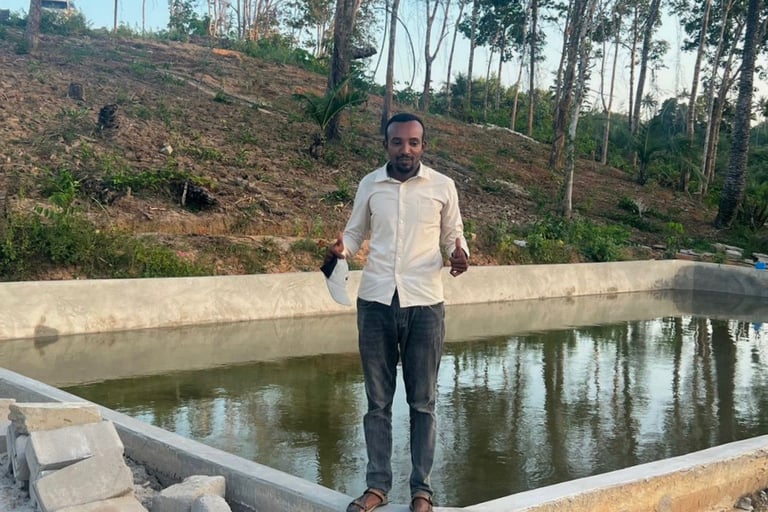

Ali Issa at the tilapia rearing pond that he built
IN MEMORY OF ALI ISSA
who proposed and began this project
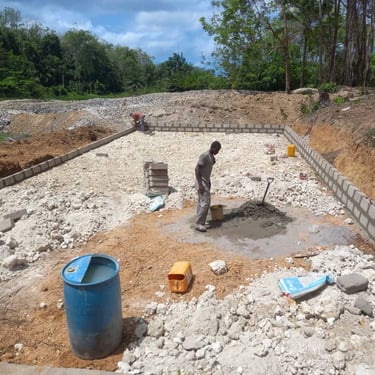
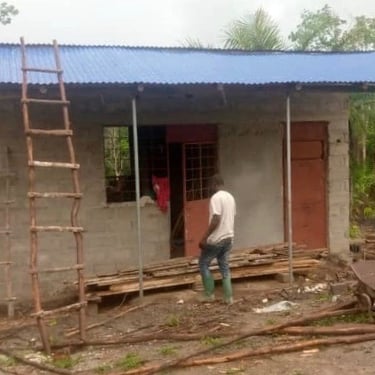
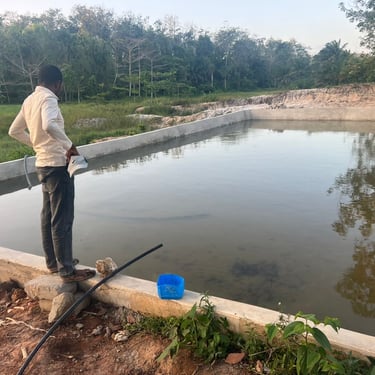
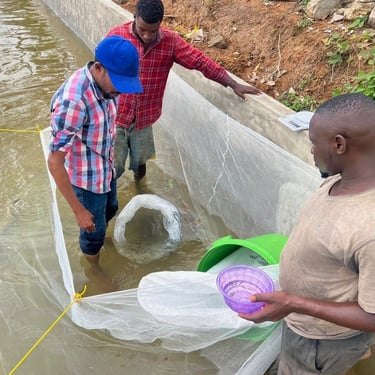
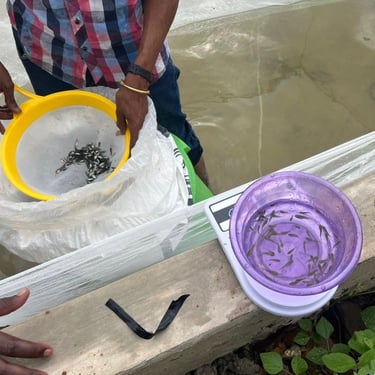
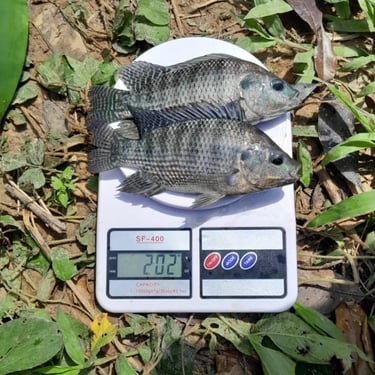
There were 10,000 inch-long fingerlings
Stocking with fingerlings
Ali building the rearing pond
Building the farm's storage
Tilapia about 1/4 market size
Rearing pond finished
MISSION
To enhance the lives and livelihoods of the people of Pemba Island
©2025 Pemba Foundation.
CONTACT
SIGN UP
For our newsletter
In the USA:
+1 617 669 9628
call or WhatsApp
jangier@pembafoundation.org
In Tanzania:
+255 776 761 370
call or WhatsApp
nassormarhun@pembafoundation.org
